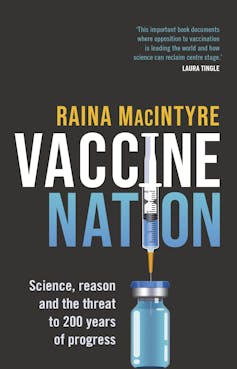
Raina MacIntyre is one of Australia’s most respected epidemiologists. She was a familiar face and calm voice during the COVID-19 pandemic. So when I was asked to review her new book Vaccine Nation I was delighted to accept.
Review: Vaccine Nation: Science, Reason and the Threat to 200 Years of Progress – Raina MacIntyre (UNSW Press)
Interestingly, MacIntyre initially planned to become a cardiologist, but was drawn instead into infectious diseases and vaccines. Her subsequent career has spanned everything from fieldwork during Australia’s early rollout of the Hib vaccine – which protects against potentially fatal respiratory infections, including meningitis – to advising governments on biosecurity and bioterrorism. Her previous book, Dark Winter, explored pandemic threats and biosecurity.
Vaccine Nation is, in many ways, a natural sequel to that earlier work – though this time, the threats are as much social as they are biological. The book blends a sweeping history of public health with a clear examination of our messy present. It delivers a timely, urgent and often deeply personal account of vaccination’s role in our world.

Despite its 247 pages and more than 400 references, Vaccine Nation is anything but dry. MacIntyre is a natural storyteller. She opens with a haunting scene from 1953: a five-year-old girl named Martha Dillard contracted polio after attending a birthday party. Dillard would spend the rest of her life in an iron lung.
“Imagine being imprisoned in a metal casing, unable to walk or see the world,” MacIntyre writes. “People have lived like that for up to 70 years.”
From there, the book takes readers on a brisk and engaging tour through the triumphs of vaccination – its success in all but eradicating smallpox, polio, Hib and measles. These quiet public health revolutions have boosted life expectancy and saved millions of children.
MacIntyre doesn’t shy away from vaccination’s more troubling stories, either. She acknowledges the rare but real risks of side-effects, and discusses the disastrous Cutter Laboratories incident in 1955, when an improperly manufactured batch of the polio vaccine containing the live virus was given to an estimated 120,000 children in the United States. She also confronts the ever-present difficulty of communicating risk to a sceptical public.
Authority and exasperation
There is no single chapter dedicated to COVID-19, but the pandemic runs through almost every section of Vaccine Nation. MacIntyre writes about it with authority and exasperation.
She is scathing about the failures of public health messaging and the mainstreaming of anti-vaccine sentiment – even among some doctors. She describes attending an international influenza conference in 2024, where most attendees, despite being public health experts, were not masked.
“I took the mask off to present, to eat in the exhibition hall where food was served, and during long conversations with others – and caught COVID as a parting gift.”
For me, one of the book’s most memorable analogies is its comparison of COVID-19 to syphilis, known as the “great imitator” for the variability of its symptoms and adverse effects.
COVID-19 has a similar capacity to damage multiple organs and manifest in unpredictable ways. MacIntyre calls it “the gift that keeps on giving”, warning that reversing the damage will be an uphill battle. “Any action to mitigate it will likely be too little and too late, especially for today’s children.”
Science, equity and the anti-vax backlash
MacIntyre’s frustration is clear, but so is her commitment to fixing what’s broken. She is at her best when connecting science to society and politics.
She calls vaccination “the great equaliser”: when coverage is high, it is capable of protecting even the most disadvantaged. Yet she is acutely aware of the inequalities that persist. Many vaccine and drug trials are conducted in low- and middle-income countries, but the benefits often go first to wealthier nations.
MacIntyre, who is of Sri Lankan background, is also candid about the racism and sexism she has encountered in medicine and global health. “The promotion of women in medical research,” she writes, “despite their great work and important role, overwhelmingly uses white imagery and white role models.”
She shares personal stories, like her elderly father’s harrowing experience in hospital, where ageism and neglect turned a minor stroke into a months-long ordeal.
In another chapter, she recalls a friend who, influenced by alternative health misinformation, refused life-saving cancer treatment. “We now live in a post-truth world of social media,” she writes, “where it is difficult to differentiate fact from fiction.”

MacIntyre argues the current anti-vaccination backlash and broader scepticism towards science stem from a complex mix of historical, cultural and political factors, not just from social media.
The cumulative effect is a deeply rooted scepticism that now threatens not only vaccination programs, but the credibility of science and public health more broadly.
Central to this reaction is the trauma and anger generated by the COVID-19 pandemic and its associated public health measures. The book highlights how anger, combined with pandemic fatigue, has been misdirected at public health advocates and scientists. “People deal with loss and grief in different ways,” MacIntyre notes, “but anger is part of this, and public health and people advocating for the prevention of COVID-19 are easy targets for that anger.”
Historical incidents, such as vaccine safety scares and the misuse of vaccination programs for intelligence operations, have “seeded distrust” that anti-vaccine activists continue to exploit. MacIntyre also points to cultural differences. In countries with strong traditions of individualism and low trust in government, such as the United States, anti-vaccine sentiment has found particularly fertile ground.
Importantly, MacIntyre observes that anti-vaccine sentiment has shifted from the fringes to the mainstream, even among some healthcare professionals. This mainstreaming has been fuelled by disparate groups, such as “alternative lifestyle communities and right-wing extremists”, coming together around opposition to COVID-19 vaccines.
The rise of disinformation and pseudoscience, especially via social media, has further muddied the waters. “Presenting facts and figures to the anti-vaccine lobby does not work,” MacIntyre observes. “Anti-vaxxers often use emotive anecdotes of children with complex illnesses or who have died, often with graphic photographs, attributing these tragic cases to vaccination, without any evidence.”
MacIntyre is refreshingly honest about her own missteps. She describes trying and failing to convince a friend to get vaccinated. She reflects on the “move-on mentality” that made public health workers scapegoats during the pandemic. And she doesn’t spare governments, health agencies, or even her own profession from criticism.
Reasons for hope
Despite the sometimes bleak outlook – falling vaccination rates, politicised science, rising pseudoscience – MacIntyre remains a passionate advocate for vaccines and for the public’s right to truth. She highlights reasons for hope: the astonishing speed of COVID-19 vaccine development and promising research into vaccines for cancer, heart disease and multiple sclerosis.
MacIntyre’s writing is clear and engaging. She explains complex medical and epidemiological concepts with real-world examples and vivid storytelling. That said, some sections of Vaccine Nation, especially those explaining immunology or epidemiological principles, can get a little technical for general readers. Terms like “immunosenescence” (the decline in the immune system that comes with aging) or “adjuvant” (a drug that increases the effectiveness of other drugs) sometimes appear without enough explanation.
Key themes, such as anti-vaccine sentiment, equity and pandemic preparedness are repeated across chapters. This repetition reinforces the message, but for some readers it may feel slightly excessive.
Vaccine Nation is not just a history of vaccines, nor is it a simple attack on anti-vaxxers. It is a compelling call for science to “reclaim the stage” – to speak clearly, empathetically and honestly in an age of misinformation and distrust.
MacIntyre’s voice is urgent but always calm. Her arguments are passionate, grounded in evidence and driven by a deep commitment to public health. If you want to understand how we got here – and what it will take to rebuild trust in science and vaccines – then Vaccine Nation is essential reading.
As MacIntyre warns: “A new pandemic will occur – the question is when, not if.” Whether we will be ready depends, in large part, on whether we can restore the fragile trust science and public health depend on.
Adrian Esterman receives funding from the NHMRC, MRFF and ARC.
This article was originally published on The Conversation. Read the original article.







